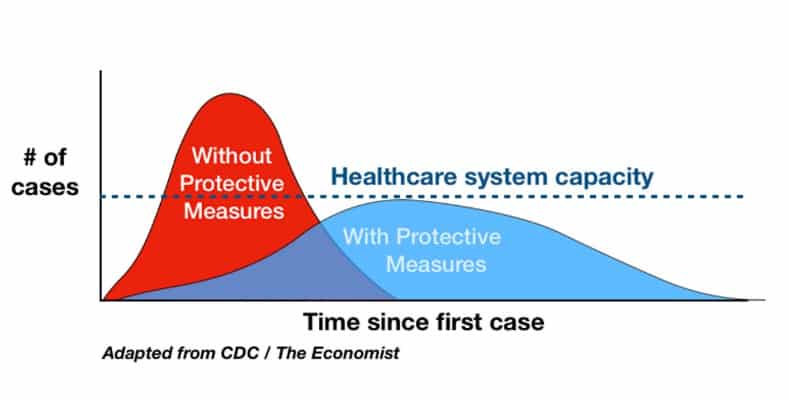How I am Flattening the Curve: Strategies to help with COVID-19
Everyone in the world is being affected by this pandemic of COVID-19, A new disease that made a jump from either a bat or pangolin carrying the SARS-CoV-2 virus and crossed into the human species after possible injection. The COVID-19 disease is making billions of people scared, desperate, and almost helpless. Based on my own research from experts dealing with COVID-19, CDC, and my nutrition research, examine.com, I came up with my own protocol to help keep myself and those around me safe.
I have been doing this for about a week now and will continue to do this until this pandemic is under control. Even while self-isolating myself and only having consistent contact with one other person I still believe this to be a good protocol mainly because of long incubation time of the virus, up to 2 weeks, and its ability to stay in the air for up to 3 hours. Potentially I could be a carrier of this virus with no symptoms yet or completely asymptomatic. This thought makes me think I have Schrodinger’s Virus, act like I have the virus without knowing if I do but hope I don’t have it. So, with this mindset I will do my part to not contribute to any statistics in a negative way. I can be beneficial to think that everyone could have the virus as well, not in a hateful way, but to give yourself the proper precautions.
Basics: The solid foundation that everyone should be doing

Self-Isolation – The less you are around people the better for you and others.
Washing your hands – Twenty seconds of proper hand washing. After using the restroom, before eating, after going outside, after unwanted or necessary contact of a person or object, and after coughing, sneezing, or blowing your nose. Look at the picture to the right for the best handwashing practices.
Antibacterial hand sanitizer – soap is better in this situation, but still can help reduce exposure.
Covering your coughs and sneezes – right now I can feel my allergies kicking in so I’m making sure to take my meds to eliminate any excessive sneezing, but if I can’t contain it then I will just stay home. No need to be outside or interact with people right now.
Physical Distancing – 6 feet of space minimize; this is the distance a droplet can fly from a sneeze or cough. Also, no handshaking or hugging of people you aren’t in isolation with.
Avoid anyone coughing or sneezing – This is common sense, but can be forgotten at times.
Don’t Touch your face – if the virus is on your hand and then you touch your face you can then breathe it in or even your eye can absorb it.
Monitor Symptoms – Fever, dry cough, labored breathing, and muscle aches. If any of these symptoms arise then, contact your doctor. Just to be on the safe side
Masks – any barrier over your mouth and nose reduces the distance any particles or droplets can fly. Wear these in public and especially while exercising outdoors. They can be tough to breathe through, but it’s for the best. Also by wearing them in general can help strengthen your diaphragm muscles which is never a bad thing.
Intermediate – These are for overall health and for some sanity reasons
Exercise – One of the best things for mood, a good functioning immune system, and stress reducer is exercise. By creating your own stress through exercise will help you deal with everything around you 10x better. Also, this helps keep NK cells nice and strong. I suggest primarily doing this indoors, so you are coughing and breathing excessive germs everywhere. If you do workout outdoors do it far from people like 12 feet if possible and wear your mask.
Sunlight – Just as important as exercise and for the same reasons.
Movement – Mood is attached to your movement. Being physically sluggish makes you feel sluggish, being active makes your brain active. Walking, cleaning, being productive
Eating healthy foods – veggies, healthy meat (grass-fed beef, chicken, lamb…) berries, healthy fats (olive oil, avocado oil, and coconut oil). Try to limit sweets or excessive carbs such as excessive amounts of juice, candy, soda, or chips. A high blood sugar spike can slow your immune system
Talking to friends, family, and co-workers often – Facetime, zoom, skype…. any software that gives you a way to communicate while seeing their face is great. Keeping in contact with those you care about helps you and them during this time. If possible, do bike rides together. The bike gives a barrier to keep 6 feet apart which is awesome, but you get sun, exercise, and social bonding. Massive win!
Also Read: Workouts
More Advanced – These are some other strategies that COULD help. Zero evidence with COVID-19
Zinc – 75- 100 mg of a zinc lozenge helps with lessening the replication of the virus once it is in the throat. This can help lower the viral load which helps the immune system in terms of the number of it has to eliminate. This is a HIGH dose of zinc and should be done for only 2 weeks. I would add in a copper supplement and a good multivitamin to help with mineral deficiencies that high doses of zinc can cause. Or have a little bit of liver for a meal, which can help most mineral deficiencies.
Vitamin D – This vitamin, which is more of a prohormone, can help with upper respiratory infections. Also being outside and in the sun is massively beneficial. So, UNLESS you know your Vitamin D blood serum levels, stick to around 1000 – 2000 IU to just cover your bases.
Vitamin C – 2000 mg is shown to lessen the duration of a cold if taken before you contract the virus. This is quite a high Vit. C dose. Careful as it can causes a lot of stomach distress. Higher doses than 2000 mg haven’t shown any benefit in terms of viral protection.
Fringe Strategies – Might help, but has limited studies on if it is efficacious for COVID-19
Garlic – this has been shown to increase the number and activity of NK cells which is a big part of the immune system. Decent for prevention and doesn’t seem to help once infected.
Saline Spray – Keeping the sinuses clear can help minimize sneezing and spreading germs.
Elderberry – Has been shown to kinda help or possibly make things worse. So be wary of this one. Not the time to experiment with this supplement. Elderberry ramps up the immune system, which is terrible. This can start to damage healthy cells on top of trying to work on viral cells.
Echinacea – Shown to have a small benefit for prevention and reduction of the timeline for the cold.
Conclusion
This is just my personal tactics I’m trying to utilize on some of the best things I can do to help. As soon as more information is available I will update this blog and apply the technique for myself. I’m not a medical professional so this isn’t supposed to replace any advice your doctor recommends. Below I will link to some discussions I had with some health professionals about what they are doing for their clients, self, and families. If you have any other topics you are interested in learning to help with COVID-19, please reach out to me.







